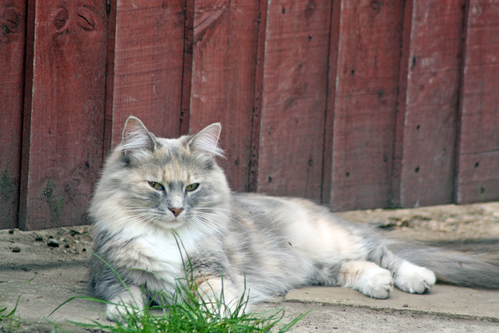Everyone who has a barn with livestock in it also has at least one barn cat living in it. Some folks just “allow” the cats that show up to use the barn as a shelter and as for the rest of the cat’s requirements, they are on their own. This, of course, is not recommended, but what do these cats living outside need to be healthy and happy?
First, of course, they need some place to get out of the elements that is safe and dry. Safe means a place where larger predators can’t get them, like raccoons and fisher cats. A hay loft is often the choice with nice soft hay to bed down in. Some barns have cat doors that allow the cats into the tack room or office, where there are saddle pads for beds, or even cat beds, just for them.
These cats are living outside, and so have the opportunity to do some real hunting, as opposed to those that live inside and only hunt toys. But, this should not be their only food source. The easiest thing to provide is a bowl of dry food, in a place where there is enough room so there is no fighting over it and again, out of the elements. A bowl of clean water should also be nearby. Some folks provide wet food also, and as this is a treat, the cats always show up at wet feeding time. This gives you the added advantage of being able to capture one of these kitties if he has a problem or needs some handling.
If you don’t neuter whatever cats are living in your barn, you will have litter after litter of kittens. This is fun for the first litter, who doesn’t love kittens, but the litters come really quickly and steadily. It is crucial to the health and longevity of the cats that they be neutered. The males won’t wander and come home all beat up and the females will still be great mousers.
You will want to worm your barn cats. If they are eating what they are catching, they will have worms. You can do this in their food, but the best way is to ask the vet when she is making a farm call.
Most people don’t vaccinate their barn cats with the “full boat” of vaccinations, but vaccinating for rabies is mandatory. Most people get their barn cats vaccinated when the large animal vet comes for the other animal’s spring shots. All large animal vets carry small animal vaccines in their trucks. You don’t even have to catch the cats and take them to the vet!
According to Dr. Bernadine Cruz, a Veterinarian with the
American Veterinary Medical Association, the prevalence of rabies infection in
Cats has increased, “Rabies. Just the word conjures visions of Cujo, the
Stephen King rabid St. Bernard, and death and denial. Though the prevalence of
rabies in the
What to do if you have too many barn cats? Your local SPCA will help you with recommendations about catching them and will take them into their shelter for rehab and adoption. There is often a fee involved with the drop off. Your large and or small animal vet will also be an informational source as to local no kills shelters.
Your barn or outdoor cats deserve to be as well taken care of as the inside pets. They not only add to your life as pets, but they keep your barn and property free of small rodents.
Plant some cat nip for them next spring and you will always know where to find them!

